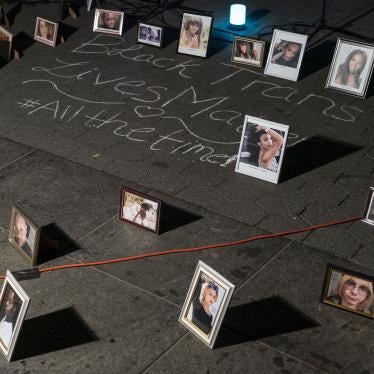January 23, 2003
President George W. Bush
The White House
1600 Pennsylvania Avenue, NW
Washington, D.C. 20500
Dear President Bush:
In your New Year’s Day address to the nation, you proudly described America as a “land of justice, liberty, and tolerance.” Yet in the U.S. military, men and women who have served their country with courage, skill, and distinction are discharged every day simply because of their sexual orientation. For many minority groups, the U.S. military has helped to break down walls of prejudice; yet for gay men and lesbians, those barriers of intolerance remain. We ask you to take the necessary steps to end military rules that discriminate against gay and lesbian servicemembers.
In the attached report, Uniform Discrimination: The ‘Don’t Ask, Don’t Tell’ Policy of the U.S. Military, Human Rights Watch details the history, nature, and impact of the military’s current policy toward gays and lesbians. We conclude that the “don’t ask, don’t tell” policy is based on outdated prejudices, violates fundamental human rights, and has not been shown to further the U.S. military’s effectiveness. Indeed, the policy is counterproductive: it denies the country the service of skilled, trained, and dedicated servicemembers.
As you know, the “don’t ask, don’t tell” policy, enacted into law in 1993, permits gays and lesbians to serve in the military only on the condition that they are silent and celibate. If they acknowledge their sexual orientation by word or deed, or if they are investigated and found to be homosexual, they are discharged, regardless of their military skills or record of service. No such rules apply to heterosexuals.
Supporters of “don’t ask, don’t tell” argue that permitting acknowledged gays or lesbians to serve in the military would impair unit cohesiveness and hence military effectiveness. There is no evidence to support that argument. Over the last decade, a number of U.S. allies, including the United Kingdom, Canada, Germany, and Israel, have changed exclusionary policies and accepted openly gay men and women into their armed forces without impairing military effectiveness. Today, most NATO countries permit gays to serve on the same terms as heterosexuals.
During the Gulf War in 1991, President George H.W. Bush suspended discharges under the regulations then in place that prohibited gays from serving, thereby acknowledging that the armed forces needed the contributions of all Americans who wished to serve their country in a time of need. We are aware of no evidence that the military campaign in the Gulf was in any way compromised by the presence of gay and lesbian servicemembers. Indeed, supporters of “don’t ask, don’t tell” have not been able to point to any empirical evidence of unit disintegration or bad morale in the U.S. military units where acknowledged gays or lesbians have served. It is noteworthy that, according to one recent survey, 39 percent of Navy sailors personally know a servicemember who is homosexual.
As President, you have inherited a legacy of prejudice similar to that faced by President Truman in 1948. Supporters of racially segregated military units insisted that racial integration would destroy unit cohesion. No such thing happened, however, when President Truman disavowed that prejudice and ordered unit integration in 1948. That act of leadership led to the integrated military that serves America with such distinction today. There is no reason to believe that the U.S. military would achieve any lesser professionalism if policies that discriminate against gays and lesbians were ended today.
The “don’t ask, don’t tell” policy is predicated on heterosexual prejudice, fears, and stereotypes toward gays and lesbians. Yet there has been a sea-change in American public attitudes towards homosexuality since the policy was created. Laws criminalizing sodomy have been struck down or legislatively repealed; laws and regulations guaranteeing employment rights for gays have been enacted; public attitudes toward gays have been increasingly tolerant; and public opinion polls show majority support for permitting gays to serve openly in the military. Today, the “don’t ask, don’t tell” policy is the only law in the United States that requires the dismissal of someone simply for acknowledging his or her homosexuality.
Military life, understandably, is governed by rules and strictures necessary to the military mission that would have no place in civilian life. However, rules that pander to prejudice are not necessary to the military mission. Codes of conduct that apply to all servicemembers, without regard to sexual orientation, could address any individual problems that might arise from ending discriminatory policies against gays and lesbians.
We urge you to exercise leadership on this matter of basic fairness and justice. The United States has a history of progressively repudiating prejudice and discrimination against groups of people. We ask you to lead the country further along this path, by rejecting military policies that discriminate on the basis of sexual orientation.
Sincerely,
/s/
Kenneth Roth
Executive Director
Cc: Hon. Donald Rumsfeld, Secretary of Defense








